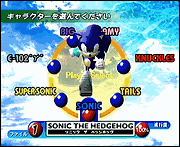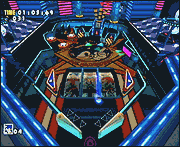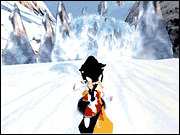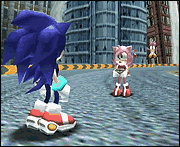 |


SONIC ADVENTURE
Copyright © 1998 Sega Enterprises, Ltd.
Sega Dreamcast (1 GD-ROM)
Action/Adventure
1 Player
VGA Compatible
Internet Enabled
VMS Mini-game included
HD4-0001
¥5800
Available now in Japan
Where to buy
FAQ
—by Kenneth Lee




















|
 |

Back in November of 1998, Sega's Dreamcast was launched. What should've
been a stunning debut with unparalleled sales turned out to be a fiasco of
sorts, as a shortage hit Sega and the majority of gamers waiting for
systems were left empty-handed. And worse still, the debut batch of games
for the Dreamcast left much to be desired, as even the flagship VIRTUA
FIGHTER 3TB was a rushed port. But now all has been made right with the
world debut of Sega Japan's SONIC ADVENTURE. This is the first true
world-class title for the Dreamcast, and SONIC ADVENTURE is pure gaming
brilliance. Folks, this is what you've all been waiting for from Sonic Team
after years of absence—the next true installment of the SONIC series.
From the best graphics ever seen in a video game, to the rockin'
soundtrack, to the insane level design, SONIC ADVENTURE is Yuji Naka's
greatest masterpiece and the must-have game of the year.
 The premise is simple: Dr. Eggman (a.k.a. Dr. Robotnik) is out to collect
all the Chaos Emeralds to give to his new "pet," the Chaos monster. If he
succeeds in collecting all the gems it could mean the end of the world as
we know it. While the plot may not be the most creative, it is at least
true to the legendary SONIC series: Always a tale of Sonic vs. Dr. Eggman.
But this time things are a bit different; the most glaring change being the
astounding graphics and large cast of characters. You can play as Sonic or
one of his buddies: Tails, Knuckles, Amy, Big the Cat, or E-102. And the
characters' stories all mesh together to flesh out the complete plot. You
can see various events—that you saw earlier as Sonic—occur
through Tails's eyes, and we discover the tragic events of Knuckles's past. The premise is simple: Dr. Eggman (a.k.a. Dr. Robotnik) is out to collect
all the Chaos Emeralds to give to his new "pet," the Chaos monster. If he
succeeds in collecting all the gems it could mean the end of the world as
we know it. While the plot may not be the most creative, it is at least
true to the legendary SONIC series: Always a tale of Sonic vs. Dr. Eggman.
But this time things are a bit different; the most glaring change being the
astounding graphics and large cast of characters. You can play as Sonic or
one of his buddies: Tails, Knuckles, Amy, Big the Cat, or E-102. And the
characters' stories all mesh together to flesh out the complete plot. You
can see various events—that you saw earlier as Sonic—occur
through Tails's eyes, and we discover the tragic events of Knuckles's past.
 The graphics in SONIC ADVENTURE are simply the most astounding,
jaw-dropping visuals to have ever graced a video game! Forget VOODOO2,
forget ZELDA, or even VF3.
Sonic Team has raised the bar for graphical
excellence in a video game. The characters in SONIC ADVENTURE are all
extremely well built with many polygons, but they are so well constructed
that you almost never see them as polygon models, but rather as amazing 3D
cartoon caricatures. When you see Sonic blasting through the Emerald Coast
with a killer whale chasing him down, shattering the entire harbor behind
him all in a rock-solid hi res 30 frames-per-second, you will realize the
power. In fact, every single stage is crafted with care. From the
breathtaking Windy Valley, with it's open-ended atmospheric layout, to the
madness-inducing cyber-mechanical final stage, Final Egg, the years of
research that Yuji Naka and Sonic Team have done visiting real world
locales are readily apparent. The best example is the complete Mystic Ruin
area, with its lush jungles, rivers, and Aztec-inspired ruins. Indeed, the
graphics serve as the crowning achievement and highlight of SONIC
ADVENTURE, and there are not enough adjectives to describe the visuals you
will see. The graphics in SONIC ADVENTURE are simply the most astounding,
jaw-dropping visuals to have ever graced a video game! Forget VOODOO2,
forget ZELDA, or even VF3.
Sonic Team has raised the bar for graphical
excellence in a video game. The characters in SONIC ADVENTURE are all
extremely well built with many polygons, but they are so well constructed
that you almost never see them as polygon models, but rather as amazing 3D
cartoon caricatures. When you see Sonic blasting through the Emerald Coast
with a killer whale chasing him down, shattering the entire harbor behind
him all in a rock-solid hi res 30 frames-per-second, you will realize the
power. In fact, every single stage is crafted with care. From the
breathtaking Windy Valley, with it's open-ended atmospheric layout, to the
madness-inducing cyber-mechanical final stage, Final Egg, the years of
research that Yuji Naka and Sonic Team have done visiting real world
locales are readily apparent. The best example is the complete Mystic Ruin
area, with its lush jungles, rivers, and Aztec-inspired ruins. Indeed, the
graphics serve as the crowning achievement and highlight of SONIC
ADVENTURE, and there are not enough adjectives to describe the visuals you
will see.
 While there is some pop-up (quite noticeable at times), it is always in the
distant background and it never affects the gameplay. There are some
moments of slowdown as well, but this is a very rare occurrence and when it
does happen, it's very brief. Despite these minor negatives, this is the
single most graphically impressive game ever. While there is some pop-up (quite noticeable at times), it is always in the
distant background and it never affects the gameplay. There are some
moments of slowdown as well, but this is a very rare occurrence and when it
does happen, it's very brief. Despite these minor negatives, this is the
single most graphically impressive game ever.
 The main themes for SONIC ADVENTURE are made up of classic 80s Rock (Van
Halen, Def Leopard, Metallica come to mind). This is a very good thing, as
Sonic Team's last endeavor,
BURNING RANGERS,
went off on a very derivative R&B trip. But as in its level design, the aural assault for
SONIC ADVENTURE is varied and fresh, with not only 80s Rock but also nice
tribal ethnic music (Mystic Ruin) and cool techno Drum & Bass. Also, the
characters' voices are all excellently portrayed by some very talented
seiyuu (Japanese voice actors). In fact, a highlight of the game would have
to be Sonic's voice, which is an excellent parody/tribute to Bud Mint of KO
CENTURY BEAST anime fame. The combination of hip English words with
colloquial Japanese produces some extremely hilarious dialog. The main themes for SONIC ADVENTURE are made up of classic 80s Rock (Van
Halen, Def Leopard, Metallica come to mind). This is a very good thing, as
Sonic Team's last endeavor,
BURNING RANGERS,
went off on a very derivative R&B trip. But as in its level design, the aural assault for
SONIC ADVENTURE is varied and fresh, with not only 80s Rock but also nice
tribal ethnic music (Mystic Ruin) and cool techno Drum & Bass. Also, the
characters' voices are all excellently portrayed by some very talented
seiyuu (Japanese voice actors). In fact, a highlight of the game would have
to be Sonic's voice, which is an excellent parody/tribute to Bud Mint of KO
CENTURY BEAST anime fame. The combination of hip English words with
colloquial Japanese produces some extremely hilarious dialog.
 Interestingly, the crucial area of gameplay is where SONIC ADVENTURE both
succeeds and (at times) fails. First off, SONIC ADVENTURE is essentially a
3D Action Platform game, akin to MARIO 64.
There are huge open 3D
environments that you can explore, and you start off in a safe haven of
sorts, Station Square (the imaginary town that Sonic resides in). You can
visit various locations like the Resort Hotel, the Train Station, and a
Vegas-like gambling area, all splendidly built in 3D. From this area you
can travel directly to various stages of the game, like Emerald Coast, or
you can travel to a new location by train. There are 10 basic stages that
you will traverse as Sonic, and as I said, they are wonderfully scenic and
varied. The Casino Stage (Casinopolis) offers a NiGHTS Pinball game, and in
the amazing Ice Cap stage you end up being chased by a huge, mountain-wide
avalanche, replete with massive amounts of crumbling debris! It is amazing
to say the least. Interestingly, the crucial area of gameplay is where SONIC ADVENTURE both
succeeds and (at times) fails. First off, SONIC ADVENTURE is essentially a
3D Action Platform game, akin to MARIO 64.
There are huge open 3D
environments that you can explore, and you start off in a safe haven of
sorts, Station Square (the imaginary town that Sonic resides in). You can
visit various locations like the Resort Hotel, the Train Station, and a
Vegas-like gambling area, all splendidly built in 3D. From this area you
can travel directly to various stages of the game, like Emerald Coast, or
you can travel to a new location by train. There are 10 basic stages that
you will traverse as Sonic, and as I said, they are wonderfully scenic and
varied. The Casino Stage (Casinopolis) offers a NiGHTS Pinball game, and in
the amazing Ice Cap stage you end up being chased by a huge, mountain-wide
avalanche, replete with massive amounts of crumbling debris! It is amazing
to say the least.
 The controls for SONIC (and all the characters) are easy enough. For
example, Sonic has a basic Spin Attack (Jump) with the A Button, a Homing
Attack, also with the A button, and a Spin Dash with the B Button. Later
on, you can discover new attacks for Sonic, such as the Light Speed Dash,
and this can even be modified. Each of the other characters also has
his/her own set of unique controls, but they never stray from the
simplicity of Sonic Team's design, which is a good thing. The controls for SONIC (and all the characters) are easy enough. For
example, Sonic has a basic Spin Attack (Jump) with the A Button, a Homing
Attack, also with the A button, and a Spin Dash with the B Button. Later
on, you can discover new attacks for Sonic, such as the Light Speed Dash,
and this can even be modified. Each of the other characters also has
his/her own set of unique controls, but they never stray from the
simplicity of Sonic Team's design, which is a good thing.
 Being that this is a completely open 3D game environment, control and
camera angle are crucial. With Sonic, his Homing Attack solves the problem
of precise attacks in a 3D environment, as it (usually) homes in on the
nearest "hot spot" target (enemy or item). This aspect is a necessity in
making the game playable, because without it, guiding Sonic to attack at
the exact right angle would be a formidable exercise in patience. Being that this is a completely open 3D game environment, control and
camera angle are crucial. With Sonic, his Homing Attack solves the problem
of precise attacks in a 3D environment, as it (usually) homes in on the
nearest "hot spot" target (enemy or item). This aspect is a necessity in
making the game playable, because without it, guiding Sonic to attack at
the exact right angle would be a formidable exercise in patience.
 But the interaction between controls and camera have a few problems, such
as figuring out which direction is up (or correct). For example, in Stage
1, Emerald Coast, when Sonic is being chased by Shamu the killer whale, the
camera rapidly switches to different angles and perspectives. You see Sonic
running towards the screen and then to the side, etc., and all the while
you basically just hold Up (the direction you started the sequence with).
But on Stage 2, Windy Valley, when you're running around the spiraling
chain fence track, you actually have to constantly move the analog pad
around to guide Sonic around the winding track—a completely different
control scheme than what was used earlier. This can lead to some
frustrating moments. But the interaction between controls and camera have a few problems, such
as figuring out which direction is up (or correct). For example, in Stage
1, Emerald Coast, when Sonic is being chased by Shamu the killer whale, the
camera rapidly switches to different angles and perspectives. You see Sonic
running towards the screen and then to the side, etc., and all the while
you basically just hold Up (the direction you started the sequence with).
But on Stage 2, Windy Valley, when you're running around the spiraling
chain fence track, you actually have to constantly move the analog pad
around to guide Sonic around the winding track—a completely different
control scheme than what was used earlier. This can lead to some
frustrating moments.
 And while the control itself for SONIC ADVENTURE is for the most part
dead-on, the camera movement is probably the worst aspect of SA.
The camera is always trying to get the best (or most dynamic) angle for the gamer to
play in. And as sometimes happens in games like TOMB RAIDER,
the camera can clip into the ground or through a wall, or sometimes you can't even see
your character unless you move out of the way. At times the camera can
actually get stuck behind a wall or a section, and you have to just move
around blindly to get the camera unstuck. Most of the time, this is only a
minor annoyance, but on some stages and sections, this can lead to much
frustration and even Sonic's demise. Still, to be fair, even the great
Shigeru Miyamoto couldn't solve the 3D camera problem in his masterpiece,
MARIO 64. And while the control itself for SONIC ADVENTURE is for the most part
dead-on, the camera movement is probably the worst aspect of SA.
The camera is always trying to get the best (or most dynamic) angle for the gamer to
play in. And as sometimes happens in games like TOMB RAIDER,
the camera can clip into the ground or through a wall, or sometimes you can't even see
your character unless you move out of the way. At times the camera can
actually get stuck behind a wall or a section, and you have to just move
around blindly to get the camera unstuck. Most of the time, this is only a
minor annoyance, but on some stages and sections, this can lead to much
frustration and even Sonic's demise. Still, to be fair, even the great
Shigeru Miyamoto couldn't solve the 3D camera problem in his masterpiece,
MARIO 64.
 One other aspect of true 3D gaming that can lead to disorientation is the
problem with perspective. Every once in a while, when you are blasting
through various levels and have to land on tiny platforms, you might end up
missing the platform by a few inches due to odd perspective and misjudged
depth. In other words, you could've sworn you were on target, but instead
you were slightly off and end up dying. This is not really a problem with
SONIC specifically, but rather an inherent problem with 3D gaming in
general. It's a tricky thing to properly gauge exactly how far to jump to
the next platform. With the old-school 2D games of yore, this was never a
problem; you knew exactly how far it was to the next platform, or how high
the next ledge was (you could probably count the pixels). One other aspect of true 3D gaming that can lead to disorientation is the
problem with perspective. Every once in a while, when you are blasting
through various levels and have to land on tiny platforms, you might end up
missing the platform by a few inches due to odd perspective and misjudged
depth. In other words, you could've sworn you were on target, but instead
you were slightly off and end up dying. This is not really a problem with
SONIC specifically, but rather an inherent problem with 3D gaming in
general. It's a tricky thing to properly gauge exactly how far to jump to
the next platform. With the old-school 2D games of yore, this was never a
problem; you knew exactly how far it was to the next platform, or how high
the next ledge was (you could probably count the pixels).
 Perhaps the epitome of this problem is with the final boss encounter with
Dr. Eggman in his Egg Viper. No spoilers, but suffice to say that all the
lives I lost in that encounter were due to inaccurate Homing Attacks and
perspective. For example, when Dr. Eggman shot his spinning blades at me,
there were times when I could've sworn that I'd made the jump onto the
spinning blade. But with the true 3D perspective, it ended up that I was
just short of making the jump. Then after he draws you in (and you're
standing on the spinning blade), Sonic's Homing Attack sometimes clips
through and misses Dr. Eggman completely! What's frustrating is that
Sonic's Homing Attack is supposed to home in on the nearest "hot spot" or
target, provided that Sonic is facing it and in range. This didn't always
happen in this encounter. Also, once in a while, Sonic has a tendency to
clip through the ground or walls. These little bugs mar the overall
gameplay experience and unfortunately prevent SONIC ADVENTURE from being
perfect or classic. One can only hope that these aspects will be corrected
with the USA release, as SONIC ADVENTURE was rushed to make Christmas in
Japan. But in the end, the frustration these problems caused was nothing
compared to the sheer fun and brilliance of blasting through various levels
at ridiculous speeds. Perhaps the epitome of this problem is with the final boss encounter with
Dr. Eggman in his Egg Viper. No spoilers, but suffice to say that all the
lives I lost in that encounter were due to inaccurate Homing Attacks and
perspective. For example, when Dr. Eggman shot his spinning blades at me,
there were times when I could've sworn that I'd made the jump onto the
spinning blade. But with the true 3D perspective, it ended up that I was
just short of making the jump. Then after he draws you in (and you're
standing on the spinning blade), Sonic's Homing Attack sometimes clips
through and misses Dr. Eggman completely! What's frustrating is that
Sonic's Homing Attack is supposed to home in on the nearest "hot spot" or
target, provided that Sonic is facing it and in range. This didn't always
happen in this encounter. Also, once in a while, Sonic has a tendency to
clip through the ground or walls. These little bugs mar the overall
gameplay experience and unfortunately prevent SONIC ADVENTURE from being
perfect or classic. One can only hope that these aspects will be corrected
with the USA release, as SONIC ADVENTURE was rushed to make Christmas in
Japan. But in the end, the frustration these problems caused was nothing
compared to the sheer fun and brilliance of blasting through various levels
at ridiculous speeds.
 One special area that deserves mention is the NiGHTS
A-Life system. It
seems that this system was so popular that Naka and company brought it back
and revamped it for SONIC ADVENTURE. For those that
didn't play NiGHTS
(Saturn), there was an A-Life system that was basically made up of a
complex AI system that monitored and tracked various A-Life creatures
throughout the NiGHTS game. They were basically little eggs and creatures
that you met along the way that you could hatch, and every single A-Life
had its own individual personality. Well in SA, you find various A-Life
eggs, called "Chao" and you can bring them back to your rest areas, hatch
them, and raise them! What's so amazing is that you can download them onto
your VMS memory card and then raise them like Pocket Monsters or
Tamagotchi. There are even little mini-games that you can play on the
VMS.
In addition, each individual Chao can be named whatever you want and they
have individual stats like an RPG (Strength, Hit Points,
etc.). You can
then use your Chao to fight other Chao. Or you can upload them back into
the Dreamcast and then race them, kinda like Chocobo Racing in FINAL
FANTASY VII, only simpler. One special area that deserves mention is the NiGHTS
A-Life system. It
seems that this system was so popular that Naka and company brought it back
and revamped it for SONIC ADVENTURE. For those that
didn't play NiGHTS
(Saturn), there was an A-Life system that was basically made up of a
complex AI system that monitored and tracked various A-Life creatures
throughout the NiGHTS game. They were basically little eggs and creatures
that you met along the way that you could hatch, and every single A-Life
had its own individual personality. Well in SA, you find various A-Life
eggs, called "Chao" and you can bring them back to your rest areas, hatch
them, and raise them! What's so amazing is that you can download them onto
your VMS memory card and then raise them like Pocket Monsters or
Tamagotchi. There are even little mini-games that you can play on the
VMS.
In addition, each individual Chao can be named whatever you want and they
have individual stats like an RPG (Strength, Hit Points,
etc.). You can
then use your Chao to fight other Chao. Or you can upload them back into
the Dreamcast and then race them, kinda like Chocobo Racing in FINAL
FANTASY VII, only simpler.
 In conclusion, SONIC ADVENTURE is one of the
most amazing games ever made.
This is pure gaming excellence, as the graphics are mind-numbing, the
soundtrack kickin', and the gameplay pure bliss. SONIC ADVENTURE
is
definitely not perfect, as camera problems, perspective issues, collision
detection, and clipping detract from the overall experience. (The short 20
second endings for many of the characters didn't help either.) But one
cannot help but be amazed at the total graphical brilliance in this game.
From seeing dolphins jumping around in the water while you are thousands of
feet in the air, to the breathtaking sunset in the Mystic Ruin with
real-time lighting effects, to the epitome of "Bad-ass"—Super Sonic
going one-on-one with Perfect Chaos—this game exudes care. You can
tell that Sonic Team went out of their way to craft this game. This is one
that every gamer should experience at least once. Here is true Dreamcast
power, and Yuji Naka's masterpiece. In conclusion, SONIC ADVENTURE is one of the
most amazing games ever made.
This is pure gaming excellence, as the graphics are mind-numbing, the
soundtrack kickin', and the gameplay pure bliss. SONIC ADVENTURE
is
definitely not perfect, as camera problems, perspective issues, collision
detection, and clipping detract from the overall experience. (The short 20
second endings for many of the characters didn't help either.) But one
cannot help but be amazed at the total graphical brilliance in this game.
From seeing dolphins jumping around in the water while you are thousands of
feet in the air, to the breathtaking sunset in the Mystic Ruin with
real-time lighting effects, to the epitome of "Bad-ass"—Super Sonic
going one-on-one with Perfect Chaos—this game exudes care. You can
tell that Sonic Team went out of their way to craft this game. This is one
that every gamer should experience at least once. Here is true Dreamcast
power, and Yuji Naka's masterpiece. 
Rating: 9.3/10 |
 |

